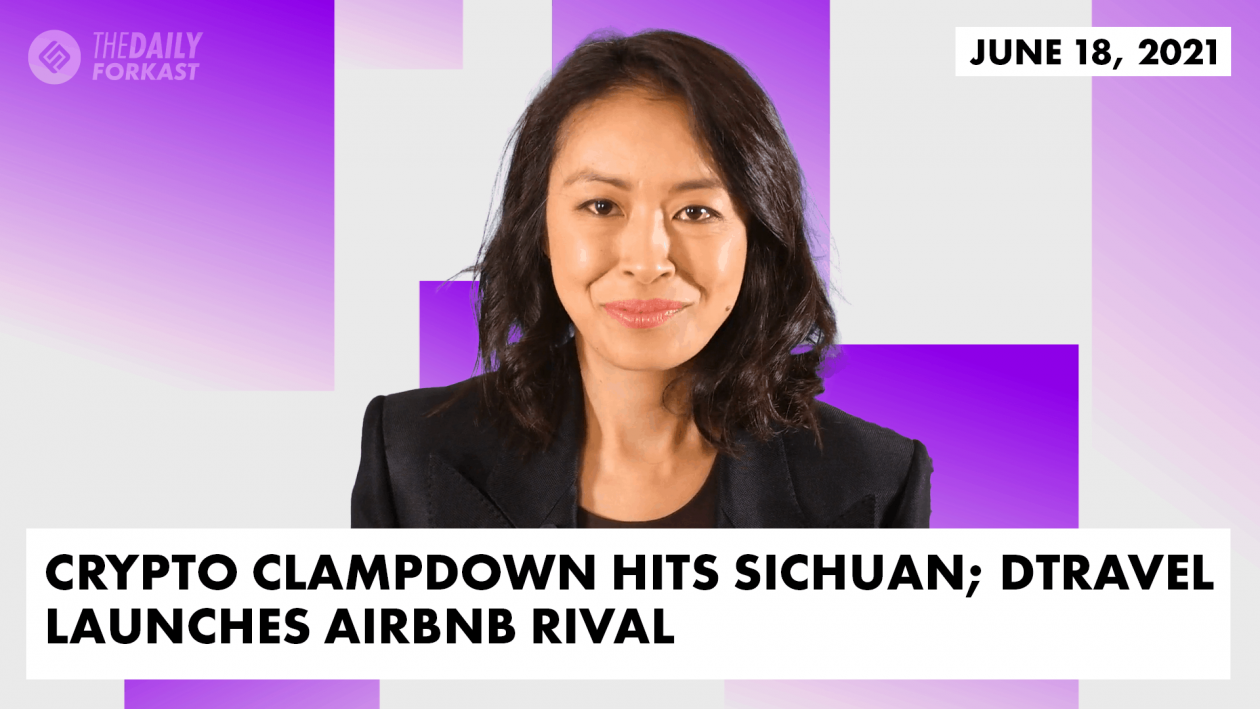China crypto mining clampdown hits Sichuan as miners seek safe havens.
Shanghai promotes digital yuan with red envelope lottery.
DTravel launches decentralized rival to Airbnb.
More on that story and other news shaping the cryptocurrency and blockchain world in this episode of The Daily Forkast.
Translate
Welcome to The Daily Forkast, June 18th, 2021. I’m Angie Lau, Editor-in-Chief of Forkast.News, covering all things blockchain.
Coming up, China’s crypto mining clampdown sees miners looking for more than one safe haven, Shanghai tries out digital yuan, and the launch of a decentralized rival to Airbnb. Let’s get you up to speed from Asia to the world.
Following on from recent crypto mining clampdowns we’ve reported on in Yunnan, Qinghai, Xinjiang and Inner Mongolia in China, local media is now reporting that Ya’an in Sichuan Province is the latest to be hit.
The reports say that miners are being told to shut down for inspection, though full details are unclear as yet. With the clampdown continuing, many players in the industry have been looking to diversify around the world.
Kazakhstan is one alternate location that we’ve been hearing a lot about, though. Hong Kong-based Poolin, which has significant operations in China, is looking elsewhere.
“We’ve considered, you know, literally every place across the globe, because that’s what we do. We consider places. That’s my job. However, I think Kazakhstan is already hit a sort of a ceiling as to how many miners can move into the country.”
De La Torre says Poolin is now looking at options across North America, in both Canada and the United States. Top of their checklist is finding low electricity costs, as well as keeping an eye on the environment by using hydro or solar power.
Meanwhile, Shanghai has just seen its first promotion of China’s digital yuan, a currency still known to many by its original project name DCEP, or digital currency electronic payment.
And so far it’s gone through 13 rounds of testing in eight cities. Shanghai held a lottery to give out 350,000 red envelopes, each containing 55 digital yuan, which had to be spent at designated shops. Those envelopes have now been given out and Forkast.News actually got to follow one lucky recipient as he set out to try spending his prize.
“From my perspective, it’s very convenient to pay with the digital currency. It’s like WeChat Pay or Alipay, but for the processing of the transaction, I think it takes more time than current Alipay or WeChat.
Yan says people are so used to using their phones in this way that he had no concerns giving it a try. But at the moment, too few shops accept digital yuan to make it a practical alternative right now. But many experts are predicting an official rollout in time for the Beijing Winter Olympics in 2022.
Onto the markets. Bitcoin was down just over 4% at a little under US$38,000 dollars as of 4:00 p.m. local Hong Kong time. And in the top ten for cryptocurrencies, it was a day of red almost across the board, with Polkadot falling just under 7% and Uniswap down 5%.
And finally this — move over Airbnb, there’s a new competitor in town, and this time it’s decentralized. Dtravel is a decentralized home-sharing platform with a team spread out across Australia, Vietnam, and the United States and created by former travel executives in partnership with Binance-backed Travala.com.
The difference? It will be community-owned and its soon-to-be-launched native cryptocurrency the TRVL token will give members of the community voting rights, allowing hosts and travelers to keep control of the platform.
“We’re unique in that from day one, we want to create a sharing economy that is actually truly shared, not only in the sense that the value is shared, but in the sense that the decision-making is shared, the formation of the entire platform is shared.”
Kim says the problem with the sharing economy at the moment is that big corporate stakeholders are still in charge, which is not always good for hosts or guests. The other key difference is that hosts will not pay fees, which Dtravel says, will keep prices even lower for customers. And in a locked-down world where people are desperate to see family and friends safely again, we could be set to see an upsurge in demand for home-sharing options.
And that’s The Daily Forkast from our vantage point right here in Asia. For more, visit Forkast.News. I’m Editor-in-Chief Angie Lau. Until the next time.

